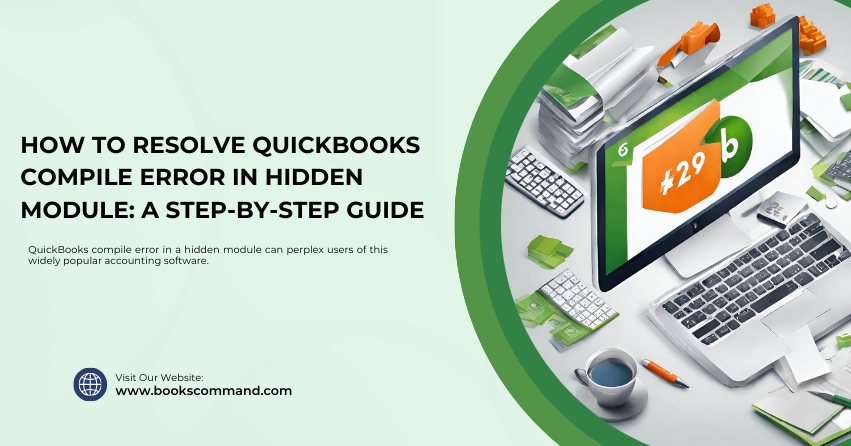
Encountering a QuickBooks compile error in a hidden module can perplex users of this widely popular accounting software. This error usually manifests itself during QuickBooks’s startup or when specific functions are accessed, leaving many puzzled about its origins and solutions.
What is QuickBooks Compile Error in Hidden Module?
QuickBooks compile error in a hidden module refers to a complex issue when the software fails to load a form or compile the code in a module. This can happen for various reasons, often related to the software’s integration with other applications or issues within QuickBooks. The “hidden module” part of the error message suggests that the problem lies in a background module that is not immediately visible or accessible to the user, making itmore challenging to diagnose and resolve.
Common Causes of QuickBooks Compile Error in Hidden Module
Understanding the root causes of the QuickBooks compile error in a hidden module is essential for effective troubleshooting. Here are some of the most common triggers:
- Damaged MS Office Components: QuickBooks heavily relies on Microsoft Office components for various functions. If these components are damaged or outdated, it can lead to compile errors.
- Conflicting Third-Party Applications: Other applications installed on your computer can sometimes conflict with QuickBooks, causing the compile error.
- Corrupted QuickBooks Installation: A corrupted or incomplete QuickBooks installation can also lead to various errors, including the compile error in a hidden module.
- Outdated QuickBooks Software: Not updating QuickBooks can lead to compatibility issues and bugs, resulting in errors.
- Network Issues: In some cases, network problems can disrupt QuickBooks’ operation, leading to compile errors in hidden modules.
Troubleshooting Methods to Resolve QuickBooks Compile Error in Hidden Module
Resolving the QuickBooks compile error in a hidden module involves a systematic approach to identify and address the underlying cause. Follow these troubleshooting methods:
- Update QuickBooks to the Latest Version
Ensure your QuickBooks is up-to-date. Regular updates often contain bug fixes and enhancements that can resolve existing errors.
- Open QuickBooks and go to the Help menu.
- Select Update QuickBooks Desktop.
- Click on the Update Now tab.
- Check the Reset Update box to clear all previous update downloads.
- Click Get Updates.
- Repair Damaged Microsoft Office Components
Since QuickBooks integrates closely with Microsoft Office, repairing Office components can resolve the compile error.
- Close all Office applications.
- Go to Control Panel > Programs and Features.
- Find your Microsoft Office installation, right-click on it, and select Change.
- Choose Repair and follow the on-screen instructions.
- Disable Startup Items and Reboot
Conflicting applications can be identified by performing a clean boot.
- Press Windows + R, type msconfig, and press Enter.
- In the System Configuration window, select the Selective startup and Load system services options.
- Go to the Services tab, check Hide all Microsoft services, and click Disable all.
- Click OK and restart your computer.
- Reinstall QuickBooks Using Clean Install Tool
A clean installation can resolve issues caused by damaged QuickBooks installations.
- Download and run the QuickBooks Clean Install Tool.
- Uninstall QuickBooks via Control Panel.
- Run the Clean Install Tool to remove residual QuickBooks files.
- Reinstall QuickBooks from the original installation source.
- Check for Conflicting Adobe Software
Adobe software, particularly Acrobat, can sometimes conflict with QuickBooks. Try updating or reinstalling Adobe products to resolve any compatibility issues.
- Configure Antivirus and Firewall Settings
Sometimes, antivirus or firewall settings can block QuickBooks processes, leading to compile errors. Configure your antivirus and firewall to ensure QuickBooks is listed as a trusted application.
- Use QuickBooks Install Diagnostic Tool
The QuickBooks Install Diagnostic Tool can automatically detect and fix issues with Microsoft components QuickBooks uses.
- Download the QuickBooks Tool Hub and go to the Installation Issues tab.
- Click on the QuickBooks Install Diagnostic Tool and let it run.
- Please restart your computer after the tool completes its process.
- Create a New Windows Admin User
If the issue is related to user permissions, creating a new Windows admin user can help.
- Go to Control Panel > User Accounts > Manage another account.
- Choose Add a new user in PC settings and follow the prompts to set up a new admin account.
- Manually Fix Compatibility Issues
If you know Windows and QuickBooks file structures, try manually locating and addressing compatibility issues within the QuickBooks installation folders. However, this is recommended only for advanced users.
- Seek Professional Assistance
If all else fails, contact QuickBooks Support or a professional IT technician. Sometimes, the issue might be too complex to resolve with standard troubleshooting methods and may require expert intervention.
Conclusion
Due to its ambiguous nature and variety of potential causes, the QuickBooks compile error in a hidden module can be daunting to tackle. However, by systematically working through the troubleshooting methods outlined in this guide, you can identify and resolve the underlying issues, restoring the smooth operation of your QuickBooks software. Remember, regular maintenance, updates, and cautious integration with other applications can prevent many such errors from occurring in the first place, ensuring a seamless accounting experience.
